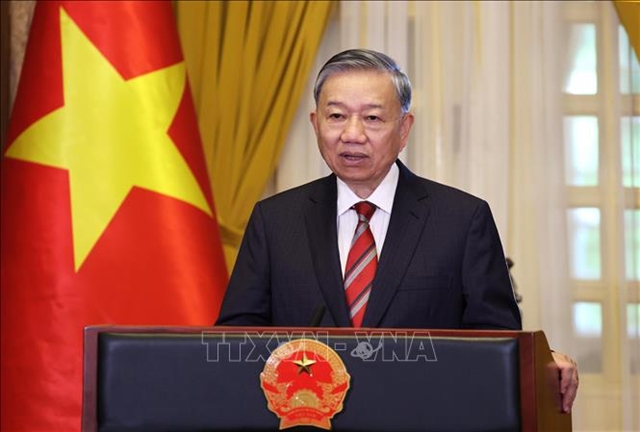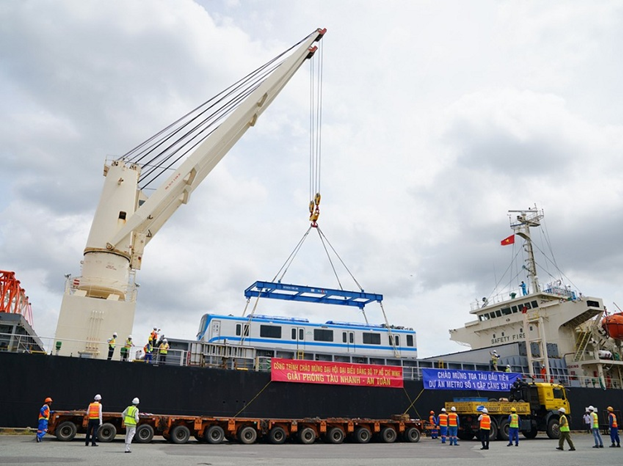 Politics & Law
Politics & Law

 |
| Party General Secretary and State President Tô Lâm VNA/VNS photo |
HÀ NỘI - General Secretary of the Communist Party of Việt Nam Central Committee and State President Tô Lâm has written an article on promoting the Party characteristics in building a law-governed socialist state in Việt Nam.
Following is a translation of the article by the Vietnam News Agency.
PROMOTING PARTY CHARACTERISTICS
IN BUILDING A LAW-GOVERNED SOCIALIST STATE IN VIỆT NAM
TO LAM
General Secretary of the Communist Party of Việt Nam Central Committee
President of the Socialist Republic of Việt Nam
Alongside implementing the cause of Đổi Mới (renewal) and developing a socialist-oriented market economy, our country has been steadily building and refining a law-governed socialist State of the people, by the people, and for the people, under the leadership of the Party. Resolution No. 27-NQ/TW, dated November 9, 2022, issued by the 13th Party Central Committee on continuing to build and refine a law-governed socialist State of Việt Nam in the new period marks a milestone and a key advance.
For the first time, our Party has issued a resolution dedicated to building a law-governed socialist State, with key objectives including: building a complete legal system that is implemented strictly and consistently; upholding the Constitution and laws, respecting, guaranteeing, and effectively protecting human and civil rights; unified State power with clear assignment, close coordination, and effective oversight; a professional, law-governed, and modern administrative and judicial system; a streamlined, clean, efficient, and effective State apparatus; a pool of officials, civil servants, and public employees with the necessary qualities, capabilities, professionalism, and integrity; and modern, effective national governance; meeting the demand of rapid and sustainable national development, with the goal of becoming a socialist-oriented high-income, developed nation by 2045.
The successful implementation of these objectives is crucial, laying a solid foundation for the country’s sustainable development in the new era—that of the nation's rise.
In nearly two years of implementing Resolution No. 27-NQ/TW, we have achieved encouraging results. Notably, there have been significant innovations in law-making, with an enhanced policy response contributing to the removal of difficulties and obstacles, promoting production and business activities, improving the material and spiritual lives of the people, and ensuring national defence and security; the organisation of the implementation of laws has become increasingly intertwined with the development and perfection of laws; administrative reform and digital transformation have been accelerated and yielding certain results; and the fight against corruption and other negative practices has been systematically and consistently carried out, achieving numerous outcomes with the spirit of no off-limits zones and no exceptions, with each case handled serving as a warning for the whole region and entire sector, thereby strengthening discipline, accountability, and strictness in the performance of public duties.
However, the construction and perfection of the law-governed socialist State of Việt Nam has still shown many shortcomings and limitations.
Awareness of the importance of the law-governed socialist State of Việt Nam is uneven at some points of time and in some places. Some major policies and orientations of the Party have yet to be institutionalised promptly and fully, or have been institutionalised but with a modest level of feasibility; and the legal system still includes contradictory and overlapping provisions that are not suitable for economic and social development, and are slow to be amended and replaced.
Mechanisms, policies and laws have yet to create a truly favourable environment to promote innovation and attract resources from domestic and foreign investors as well as from the people.
Shortcomings have also been observed in the streamlining and completion of the organisation of the State administrative apparatus to ensure its effective operation, as well as in the reduction of connecting points and intermediate levels, while some parts of the system are still cumbersome and overlapping between the legislative and executive branches, not really meeting the requirements of improving the effectiveness and efficiency of management.
Some ministries and sectors have not promoted the decentralisation and delegation of power to localities but done work of localities, leading to the existence of an ask-and-give mechanism which can easily give rise to negative practices and corruption.
Administrative reform, digital transformation and the building of e-government and digital government still see limitations. Law and policy implementation still remains a weak point, while a number of officials have yet to be active, showing a poor sense of responsibility in performing their duties; and the situation of dodging responsibility and "blaming" the legal system for their failure to perform duties and tasks has still existed in a number of ministries, sectors, and localities.
The above-mentioned shortcomings and limitations have diminished the significance and role of the law-governed socialist State of Việt Nam in practice.
To realise national development goals in the era of Vietnamese nation's rise, it is crucial to continue to renovate the methods of the Party's leadership and ruling over the State and society; promoting the people's mastery and harmoniously handling the relationship among Party's leadership, State's management, and people's mastery, and optimise the position and role of each of these factors in the process of building and perfecting the socialist rule-of-law State of Việt Nam, in which, it is necessary to pay attention to the following basic issues:
Firstly, our Party is the ruling Party, the Party's leadership is absolute, direct, and comprehensive over all areas of politics, economics, culture, society, national defence, security, and foreign affairs…
A characteristic of the socialist rule-of-law State of Việt Nam is that it operates under the leadership of the Party. Therefore, building a law-governed socialist state is the means and method to successfully achieve the objectives the Party outlined in its Statutes: "Building an independent, democratic, prosperous Việt Nam with an equitable and civilised society and free of exploitation, successfully achieving socialism and ultimately communism."
The Party leads through its guidelines and policies and directs the institutionalisation of its guidelines and policies into laws to govern the state and society. Therefore, the legal system in a socialist law-governed state must be continuously refined to institutionalise the Party's guidelines and policies, promote democracy, serve the people, and recognise, respect, guarantee, and safeguard human rights and civil rights.
To well perform this task, it is necessary to have an efficient mechanism for overseeing the institutionalisation of the Party's guidelines and policies into laws of the State.
At the same time, there must be a strict, scientific, and democratic law-making process so that policies and laws fully reflect the will and aspirations of the people; protect state interests, and lawful and legitimate rights and interests of organisations and individuals; encourage innovation; attract all resources for development; and also remain flexible to promptly introduce policy response, and handle emerging issues that could hinder development on the principle of protecting and ensuring the interests of the nation first and foremost.
As the legislative body, the National Assembly (NA) must play a leading role and implement solutions to ensure that the legal system meets the requirements of the Vietnamese socialist law-governed State. The NA Standing Committee must proactively fulfil its role as an authority responsible for interpreting the laws, ensuring that any difficulties in the implementation of the laws are promptly addressed, in line with the demands of the real life.
In the process of organising the implementation of the laws, the Government needs to monitor and evaluate the implementation of the laws to identify in a timely way the legal provisions that are conflicting, overlapping, or inconsistent with practical realities, and hindering innovation and the attraction of investment resources, production and business activities so as to take solutions to these issues to prevent certain legal provisions from becoming obstacles that impede the exercise of human rights and civil rights as well as the socio-economic development.
Secondly, under the leadership of the Party, the State manages society by law and constantly promotes democracy so that the People can participate in State management activities in accordance with the Constitution and the law.
In a law-governed socialist State of Việt Nam, the state apparatus is scientifically organised, state power is unified, with tasks allocated and coordinated among agencies in the exercise of legislative, executive and judicial powers.
Public service activities must comply with the law, exercise power according to responsibilities and competence, and be closely inspected and examined.
In addition, with the law-governed socialist State of Việt Nam’s characteristic of being under the leadership of the Party, the leadership positions in the state apparatus are arranged for the leadership positions in the corresponding Party committees responsible for leading and directing activities of agencies in the state apparatus from the central to the grassroots levels, forming a close leadership structure of the Party for state management activities.
Based on this principle and practice, in order to promote the effectiveness of state management activities for society by law in the law-governed socialist State of Việt Nam, it is necessary to simultaneously strengthen two factors: rule of morality and rule of law. In particular, the "rule of morality" element is the promotion of the advantages, strengths, positions, and roles of grassroots Party organisations, the pioneering and exemplary nature of Party members and cadres to guide the "rule of law" element, which is the implementation of society management by law.
The rule of law is a manifestation of a law-governed socialist State, therefore, Party members and cadres must set good examples and take the lead in implementing and abiding by law.
In addition, state agencies are responsible for organising the enforcement of law in their areas of management, therefore, Party members who are civil servants and public employees need to actively work within their authority and fulfil their tasks well; proactively detect and remove difficulties and obstacles in practice, especially those in law enforcement, in order to promptly devise solutions or advise and report to competent authorities for settlement.
In other words, there will be no law-governed socialist state in reality if cadres, Party members, and state agencies are indifferent, irresponsible, and insensitive to the lawful and legitimate rights and interests of the people, businesses, and to the socio-economic development.
By promoting the revolutionary ethics of each Party member and cadre, as well as the sense of responsibility and proactiveness of each agency and unit in the state apparatus, the goals of administrative reform and judicial reform will be realised; when people and businesses are truly the centre and the target of service according to the principle of the rule of law, the law will become part of life and the law will comprehensively and fully regulate all social relations.
As a result, the society will operate and develop in accordance with the guidelines and policies issued by the Party. On that basis, our country will achieve the targets of socio-economic development, national defence and security safeguarding as in line with the Platform and the national development goals for 2030 and 2045 set by our Party.
Thirdly, in the rule-of-law socialist State of Việt Nam, the people are identified as the masters according to the provisions of law, and the state operates under the principle of “people know, people discuss, people do, people inspect, people supervise, people benefit."
However, to have real democracy, in addition to having a complete legal system according to the criteria of a rule-of-law socialist State of Việt Nam, the effective operation of the political system must meet and be consistent with the principle of respect for the Constitution and the law. Similar to state management, the position and role of grassroots Party organisations and the promotion of the pioneer, exemplary, and self-sacrificing nature of Party members and cadres for the common cause are important in promoting the people's mastery in participating in state management and social management.
To achieve this, it is necessary to renovate and enhance the quality of the activities of grassroots Party cells to ensure that their operations are substantive and effective.
In addition to implementing, grasping and studying documents and resolutions issued by higher levels, as being done currently, it is necessary to consider and supplement such topics for grassroots Party cell activities as legal contents that need to be disseminated; issues arising from legal practice related to people's rights; socio-economic development, security and safety issues that need to be addressed; issues of social opinion and public concern that need to be oriented in terms of viewpoint, policy and law content, and the fight against erroneous views of hostile forces...
To achieve the goals of building a rule-of-law socialist State of Việt Nam, these practical issues need to be discussed and disseminated to Party members right from the grassroots level, with the spirit that each Party cell is a cell of our Party.
For the Party to be strong, each grassroots Party cell needs to promote its role and innovate its activities to make practical contributions to the Party. Each Party member is an important factor in spreading the spirit of democracy and the rule of law to the people, thereby fostering democracy among the people, ensuring that all individuals and organisations agree with and support the Party's policies and the State's laws, and actively comply with and implement the law.
Under the leadership of the Party, socialist democracy is promoted, the people are the subject of the process of building and perfecting the rule-of-law socialist State of Việt Nam, each citizen actively and proactively participate in law building and perfection and has the sense of respect for the law. These will create the strength of the entire political system to fulfil the national socio-economic development goals, ensure national defence and security, and bring the country into the era of the rise of the Vietnamese nation. VNA/VNS




